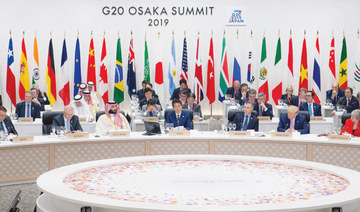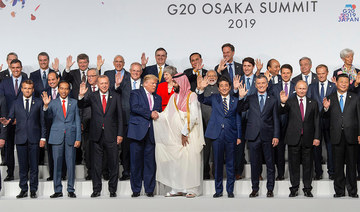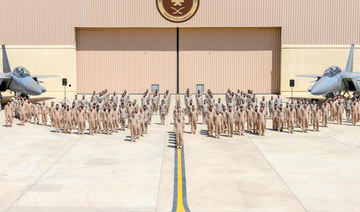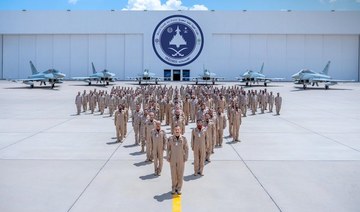‘Strangers in a foreign land, the two find escape, distraction and understanding” in Japan, according to the blurb for the 2003 Oscar-winning movie Lost in Translation.
I and my travel companion — sadly not Scarlett Johansson — took quite a long time to find anything at Kansai airport on a squally, wet night ahead of the G20 summit in the city of Osaka.
With the most powerful people in the world all heading there with their huge entourages, the organizers of the summit decided — on perfectly sound security grounds, I’m sure — to ban taxis from the airport arrival terminal.
The helpful lady at the airport information desk advised me to take a train, and handed me a map of the city’s transport system. It looked like the electrical wiring circuit for NASA mission control in Houston, but with not a word of English on it. I declined.
After a humid couple of hours in the airport terminal, our problem was solved, thanks to the intervention of the Saudi delegation in the city who took pity and sent a car to pick us up. We were on our way, in the fuzzy, sleepwalking way induced by a 10-hour overnight flight and the kind of culture shock the Bill Murray character suffered in Lost in Translation.
Osaka probably has some beautiful areas. I look forward to seeing the 16th-century shogunate castle, for example. But the airport drive is through miles of light industrial facilities, the occasional gigantic steel works, and uniformly drab residential developments.
That night passed in the jet-lagged haze the French call a “nuit blanche,” interrupted by phone calls from various people in the Middle East who hadn’t cottoned on to the five-hour time difference.
Bleary-eyed the following morning, it was time to embark on what I had anticipated would be the most demanding part of the two-day power extravaganza: getting media accreditation.
The problem was that to get inside the security cordon around the Intex center where the G20 was being held, you needed a lanyard and a badge. But the collection center for these essential documents was — you guessed it — inside the security cordon.
I solved that problem by hiring a traditional Osaka taxi driver, complete with white gloves and antimacassars, to take me to the venue.
How could the security forces suspect such a reassuring figure of anything sinister? My reasoning was sound — with much bowing of heads we sailed through the cordon.
The Intex complex is a vast mix of industrial estate, exhibition center and hotel complex built on reclaimed land in the shallow waters of Osaka Bay. The media hall for the G20 is a cavernous aircraft hanger of a building, a good 2km walk from the main entrance. It reminded me of an Ikea store, but without the Scandinavian charm.
I had made it anyway, and straight down to business. The opening press conference of the day was from the European Union, represented by EU Council president Donald Tusk and Jean Claude Junker, head of the Commission.
It was immediately obvious that the “Lost in Translation” theme had occurred to the two EU men too. Tusk revealed that “due to jet lag” he had read every word of the big exclusive interview the Financial Times had carried that morning with President Vladimir Putin of Russia.
“What I really object to are authoritarianism, personality cults and the role of oligarchs,” Tusk said. I wonder who he could have been referring to.
Junker appeared equally jet-lagged so early in the morning. He had strongly disagreed with Putin’s view that liberal democracy was an outdated concept, and stuck up for the libertarian multiculturalism the EU represents.
With a press conference under my belt by 10am, it has been a surreal few hours. I thought for one brief moment I caught a glimpse of Scarlett walking through the Intex complex but was probably hallucinating by then.
Frank Kane is an award-winning journalist based in Dubai. Twitter: @frankkanedubai


























